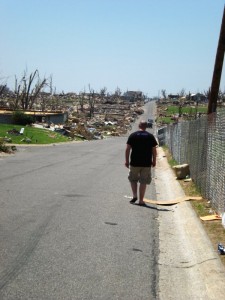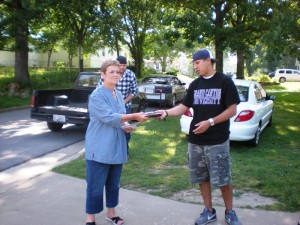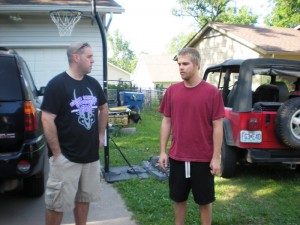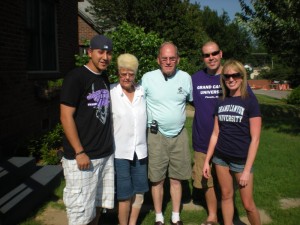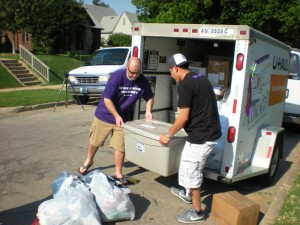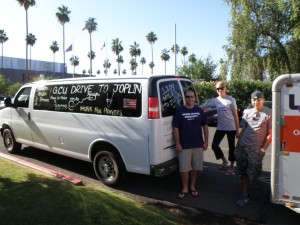“GCU’s Drive to Joplin,” a clothing and supplies drive to assist four families devastated by the May 22 tornado in Joplin, Mo., was conducted recently at the University’s main campus and Tempe and Peoria sites. Joplin is the hometown of Enrollment Counselor Aaron Johnson, who is personally delivering the donations along with GCU’s community outreach manager, Jose Moreno.
Jennifer Willis of GCU’s Communications staff is along for the van ride and blogging for Herd on Campus from the trip, which began on the morning of June 2.
Day 4: Leaving Joplin
Aaron Johnson has just spent two days in his hometown of Joplin, surveying the damage after the vicious May 22 tornado took out a huge section of the town, including the houses of people he knows.
Driving back to Phoenix in a van that took donations of clothing and supplies to survivors, the GCU enrollment counselor is in a state of shock and disbelief. Seeing the aftermath in person brought a sense of reality to what had happened.
Even so, it’s still hard to comprehend.
“Driving into town that first night (June 3), coming over the hill and seeing the destruction for the first time, was unreal,” he says. “I couldn’t believe the magnitude of it all. It had taken out so much. The more I saw, the worse it was. I had no clue it had gone so far.”
The destruction was one thing, but it was even more difficult to talk with his friends — those who had been in the middle of it, losing their houses and their belongings.
“Talking with them and hearing what they went through, seeing the state they are in, being displaced and having to stay with friends and family, made me feel for them even more,” Johnson says.
“I could see their experiences in their faces. It makes me feel even more thankful for what GCU and the Phoenix community did to help — and what we were doing by delivering the supplies personally.”
He expected the people of Joplin to be somber and discouraged. Instead, he found positive attitudes all over town.
“Coming in, I was feeling sorry for the town and for them,” he says. “But that’s not what they needed. For them, this was just an obstacle that they had to get around to start a new chapter in their lives.
“I liked how everyone saw it not as the end of something but instead the beginning of something new.”
Johnson wonders how he would have managed if he had been there when the tornado hit.
“I don’t think I would be coping as well as they are,” he says.
Now that he has seen several friends and knows they are safe, he says he can focus more on the people and less on the damage.
“I’m looking forward to seeing how they move on with their lives,” he says. “I’m anxious to see the progress and how they move forward.”
The Joplin community has always been strong, he says, and it will be OK in the end.
“I will tell you one thing, though,” he says. “I never want to drive through that part of town again. At least, not while it looks like that. I only want to see it when it starts looking like Joplin again.”
Day 3: Joplin
“The Lord has blessed us,” Kay Johnson says, even though FEMA officially has declared her house in Joplin uninhabitable.
Kay’s four children and five grandchildren are safe and accounted for. In fact, they are becoming quite cozy; with only one exception, all of the Johnson clan is living in the same house. Since an EF-5 tornado tore through the heart of Joplin on May 22, Kay and her husband, Mike, have moved in with their daughter Katie and her family.
With 11 people living under one roof, the kitchen and living room have become makeshift bedrooms. “Surprisingly, there hasn’t been any fighting,” Kay says with a laugh.
On that fateful evening, the Johnson family had just dispersed from an afternoon of hanging out at Kay’s house. Katie, her husband and their two children had left. A few minutes later, Kay’s youngest son, Ryan, his fiancée, Juah, and their 3-year-old son also had departed.
All had heard the tornado sirens go off. They paid little attention.
“I think that was the biggest problem,” Ryan says. “The sirens go off every two weeks or so at this time of the year, but nothing ever happens. People don’t take them seriously.”
Kay feared for her children. Ryan and his family had just reached the top of a hill on their way back to their apartment when they saw the dark clouds. Juah saw what she thought was a greenish light. Looking back on it now, they think it might have been the tornado hitting St. John’s Hospital, destroying the hospital’s reactors.
They decided to turn around and race back to Kay’s house. Once there, everyone huddled inside a closet as the storm hit.
“My dad and I love watching storms,” Ryan says. “We didn’t realize how bad it was, and were trying to peek out and see. But then a tree fell on the carport and we knew this was no normal storm. It sounded like a freight train.”
Says Kay: “The sound was so loud and the pressure was so intense it hurt my ears.”
A second wave hit — probably the hard rain and hail that followed the tornado — and then all was quiet.
“It was just gone,” Ryan says. “Everything was brighter.”
Kay was worried about Katie and her family. They had left just before Ryan and no one had heard from them. Phone service was spotty, and they couldn’t be reached.
“I just kept praying to the Lord over and over again to keep them safe,” Kay says.
Finally, word came that Katie had made it home and her family's house was untouched.
However, the apartment complex where Ryan’s family lived was destroyed.
“We went back two days later and it shocked me,” Ryan says. “I could stand there and look out across the town because there was no wall. Being on the second floor, it was a view of all of the destruction. I could see the hospital from where I was, which is something I never would have been able to do before.”
Most of their possessions were gone or destroyed.
“I just feel so bad for Ryan and Juah,” Kay says. “They have worked so hard for what they have. They are both still full-time students while working and taking care of their son Kreighton and planning a wedding. I’m so proud of what they have accomplished to build a life for themselves, and now all their hard work is gone.
“It’s just stuff, but to see my kids work so hard for something and then have it destroyed in an instant is heartbreaking.”
Now that her own children are safe, Kay worries about her other “family.” She is a secretary at an elementary school.
“We have 608 students,” Kay says. “I know these kids’ stories, where they come from, their parents and grandparents. Most of them didn’t have a whole lot to start off with, and now they have nothing.”
What’s ahead will be rough. Her 9-year-old grandson, Dillon, lost one of his soccer teammates, a boy named Zachary.
“We went and visited with his mom, and her faith was amazing testimony,” Kay says. “It was almost as if she was ministering to us instead of us to her. It was incredible.”
On this day, Dillon has his first soccer game since the storm hit. As Katie loads her son into the car to take him to the game, Kay gets tears in her eyes.
“They are playing for Zachary today,” she says.
For Ryan and Juah, the hardest part now is finding another place to live. Juah graduates in December from a nursing program and Ryan is in physical education, so they need to stay close by. As a young couple with few resources, they seem to be at the bottom of the housing pile.
“We have put in about 50 rental applications, going as far away as half an hour outside of Joplin,” Ryan says. “But every place we apply has 40 other applicants. A two-salary, well-off family comes in and they get the apartment over us.”
They are encouraged by friends and family members who have stepped up.
“Even one of our friends who also lost his house was there the next day with a bag of clothes and a generator, helping us dig through the rubble,” Ryan says. “It’s been inspirational.”
Watching GCU employees Jose Moreno and Aaron Johnson (no relation to Kay's family) unload a van of clothes and supplies for them, Kay smiles.
“It’s filled my heart, the number of people who have come and pitched in,” she says. “No questions asked except ‘What can we do to help?’”
Day 2: Tulsa, Okla.
For Donna and Chuck Harrington, May 22 started off like any other Sunday. But it didn’t end that way.
It’s a day that the Harringtons and all who lived through the tornado that ripped through Joplin, Mo., will never forget.
It was an extremely humid day, Donna remembers. There were notices about possible tornadoes. Like most people who live where tornado warnings are frequent, the Harringtons kept an eye on the weather but went about their day. Even when the siren sounded, they weren’t too worried.
Not until their granddaughter Hanna called them did things become chaotic. A tornado had touched down, she told them, and they needed to find shelter immediately.
Donna and Chuck grabbed two of their six show Cocker Spaniels and crammed into the shower stall in their house.
“The house started to shake, and it sounded like a freight train was running through the house,” Donna says. “I didn’t think we were going to survive, but Chuck did. He kept reassuring me.”
After what seemed like forever but was only about 10 minutes, Donna peeked out the bathroom window to see her neighbor’s house gone. Emerging from the bathroom, the couple saw what was left of their own house.
“Pretty much the only thing left was the shower stall we were in and the wall structure where our other dogs were, thankfully, still safe,” Donna says. “One of the rafters in my bedroom had fallen and smashed the bed where I sleep. Our cars were thrown blocks away. It’s just indescribable.”
Their neighbors came and checked on them, and everyone immediately began helping out.
“We were like a family with our neighbors,” Donna says.
“The sense of community in Joplin is so big, sometimes you don’t even realize it,” Chuck says. “No one is a stranger. Even if you didn’t personally know someone, if they went through it, they are now your family.”
Sorting through the chaos and the reports of what had happened, Donna was concerned for her granddaughter Hanna and Hanna's 2½-year-old daughter, Noel.
“They lived right behind St. John’s Hospital, which was hit hard,” she says. “I didn’t think there was any way they could have possibly gotten to safety, since I spoke to her right before it hit. But somehow, luckily, they managed to.”
The damage to Joplin was immense.
“Nothing is recognizable,” Donna says. “You get lost trying to find your own house. Without even realizing it, you’ve passed the place where you’ve lived for years.”
This was the first time that Donna or Chuck had been in a tornado. Donna remembers her mother putting her in the basement several times when she was small, but nothing ever hit the house. Chuck is originally from Syracuse, N.Y., and he still remembers an exceptional blizzard in 1966.
“That was the worst thing I had been through before this tornado,” he says. “After all was said and done and we saw the damage, I looked at Donna and jokingly told her, ‘Let’s go back to New York.’”
The Harringtons have temporarily relocated to Tulsa, where they are staying with their son. The amount of love and support sent their way has been extraordinary and they are grateful.
“Some friends of ours from Illinois drove one of their vans down here and just gave it to us because they knew we had lost both our vehicles,” Donna says.
The couple are like family to Heather DiFrancesco, an enrollment counselor in the Military Division at GCU. The outreach from a university 1,200 miles away brings tears to Donna’s eyes.
“It’s been so hard and so sad,” she says. “Then someone does something like this and it makes you want to go out and help others yourself.”
Which is exactly what the Harringtons plan on doing. They want to return to Joplin sometime next week to pitch in, helping those who weren’t so fortunate.
“We want to pay it forward,” Donna says.
However, their long-term plans are up in the air.
“We were originally thinking of rebuilding,” Donna says. “But now I think we are looking into just buying something already built, maybe in Joplin or maybe closer to Tulsa. It’s just crazy how your life can change in an instant.”
Day 1: The Long Road Home
Driving back to Joplin, Mo., after a tornado destroyed parts of his hometown, Aaron Johnson has plenty of time to think and reflect. He’s looking forward to getting back to his friends and family, and he’s anxious to see the damage.
From what he has heard and seen from afar, he’s expecting an emotional homecoming.
Johnson grew up 15 miles outside of Joplin but moved inside the city limits when he graduated from high school and enrolled at Missouri Southern State University. He considers Joplin his hometown. The area in which he grew up was so small that people drove to Joplin for everything: shopping, restaurants, Friday night movies.
Joplin and its surrounding area form a close-knit community.
“People are extremely accommodating,” Johnson says. “Everyone truly cares about each other, and they would do anything for you.”
The people of Joplin take pride in their city, which has a population of about 50,000. When a new store or restaurant opens up, they’re excited about it. It’s a place with history, and many families have lived in the area for generations.
“It’s the type of place where people want to live,” Johnson says. “It’s not the type of place that kids can’t wait to move away from, like a lot of small towns are. It’s beautiful and I love it.”
Traveling in the GCU van along Interstate 40 across New Mexico, Johnson struggles with his emotions.
“I don’t want to see my city in ruins,” he says. “But at the same time, I need to see it. To see what all my friends are up against. To feel connected to Joplin again.”
He’s trying to prepare himself, although he knows there’s really no way to do so.
“I consider my best friend of over 20 years to be a very strong-minded person, very emotionally strong,” Johnson says. “But when I talked to him on the phone, he just started crying because he had driven to an intersection where he and I once lived — and he didn’t even recognize where he was.”
He expects to find a community that has been punched in the stomach by natural disaster. He's aware that parts of town where he and his friends once created memories are now in ruins.
“It’s going to be a shock,” he says, “because it is a beautiful town and I hate to have to see that and to see the community go through that. Especially because it was a freak of nature and there was nothing they could do to prevent it.
“It’s going to be rough for them to bounce back, but I know they will.”
[nggallery id=38]

